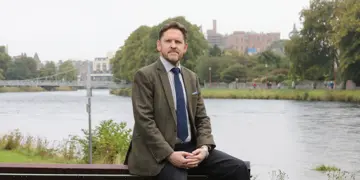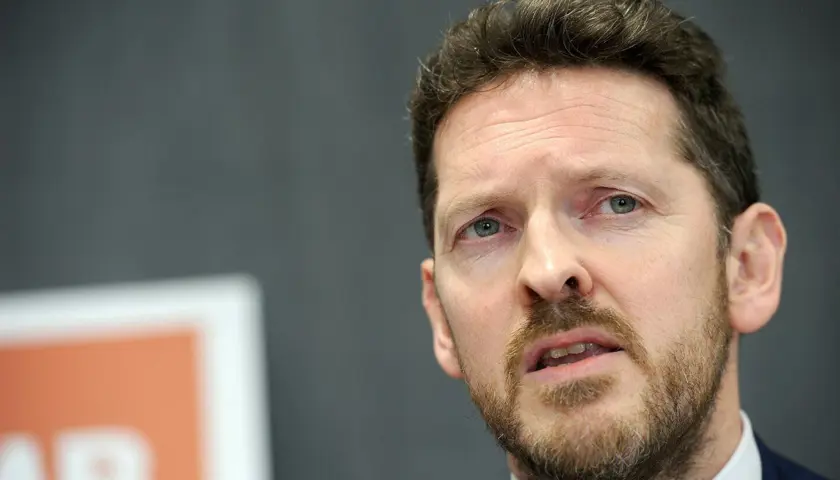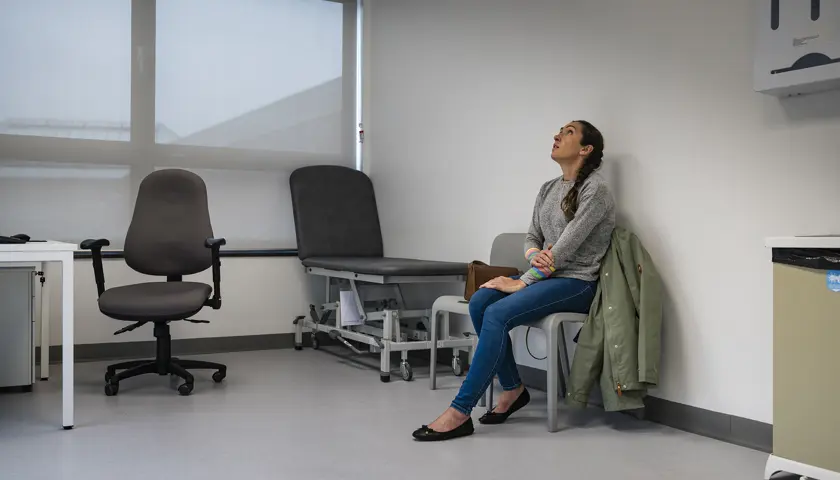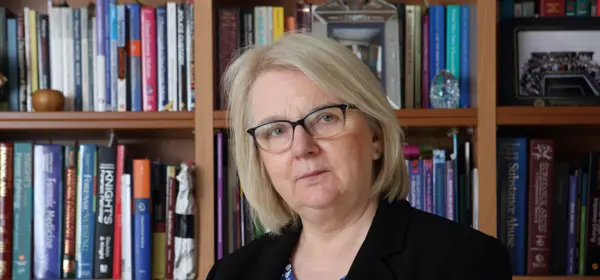Taking a stand
Taking a stand
An experienced GP found himself under attack by bullies so decided to blow the whistle. Although the decision took its toll on his life it vanquished a workplace spectre which was ruining his colleagues’ lives as well
Even today, Iain Kennedy sounds as though he can’t quite believe he was a whistle-blower.
As a respected senior GP in Inverness, holding regional and national roles, he had nevertheless felt so bullied, so threatened, so isolated, so ill – and so worried about patient care – that he decided he had no choice to raise concerns.
The decision took an enormous personal toll on him and those around him. After blowing the whistle about a bullying culture in his local health board, NHS Highland, he was personally and professionally vilified – and left with complex PTSD (post-traumatic stress disorder).
Now, however, he can look back relatively calmly on the situation, which came to a head in 2018, although it had been brewing for a number of years before that. Speaking to The Doctor ahead of publishing his own research into whistle-blowing, he reflects on the experience – and calls for action to ensure that others do not face similar trauma.
‘There was an overt culture of bullying in NHS Highland and it was coming from the very top of the organisation,’ he says. ‘There was a lot of talk about person-centred care, quality, and compassionate leadership, but what we were witnessing didn’t fit with that. We were seeing and working in a very toxic culture. There was lots of fear, there were subliminal threats of job loss or disinvestment in your department or medical practice – and when healthcare workers are working in a toxic environment, that ultimately affects patient care.’
Keen to help
There are 14 geographical or territorial health boards in Scotland, and NHS Highland is one of them. It covers a huge swath of northern Scotland in terms of square miles, but a relatively small population of around 320,000 people, many in some of the most remote areas of the UK.
Employing more than 10,000 people, it is a major economic force in the region, and essentially is the purchaser and provider of most health services, answerable to the Scottish Government. Like all health bodies, it has faced years of financial pressure, as well as increased demand and – even pre-COVID – lengthy waiting lists.
As GP clinical lead in Inverness around 2009, Dr Kennedy was keen to get involved in tackling these pressures and improving services for patients. But the more successful his efforts, the more he began to feel undermined by senior management of the health board.
‘I set up a federation of GP practices and basically worked very hard to deliver what the health board was wanting, but the harder we worked, the more success we achieved – and we did deliver on some significant areas, including anticipatory care planning and reducing polypharmacy – it seemed the health board felt threatened by our success and I would just hear negative comments about GPs in general and about my own motives.
‘I had various one-to-one conversations where I was spoken to in a very sinister way – the person speaking to me would change the tone of their voice, speak very slowly, trying to hold me accountable for things I wasn’t responsible for, and making it clear that the improvements could easily be undermined by withdrawal of funding and support. It was a lot of subtle behaviours, and there was a strong sense if you didn’t appease one particular person at the top of the organisation, that you’d be criticised and marginalised.’
At the time he was bewildered – and tired. Working full time as a GP and taking on additional roles, he didn’t understand what was going on. Hindsight has brought some clarity, laced with additional confusion. ‘Looking back, I was terrified of one individual; there’s no doubt I was terrified,’ he says. ‘When I say that, that makes me feel embarrassed, shameful, because people would regard me as quite a confident, experienced individual, and the thought that I’d be terrified of somebody – and terrified of a female – was quite difficult, and I was probably personally suppressing that fear. Like many victims of bullying, I was in a state of confusion.’
He was also energised by the fear and stood successfully to become a non-executive director of NHS Highland in 2011, which was when he first raised the issue of bullying and toxic culture – to no avail. But it also enabled him to witness that culture at first hand. ‘I became hypervigilant and was aware of the atmosphere in the board room when certain individuals entered,’ he says. ‘I still raised concerns and challenged where appropriate, but was always looking over my shoulder, waiting for the next negative comment to be fed back to me, or the next block to be put in my place.’
Fast forward to 2018 and the situation had become untenable – and its effect on Dr Kennedy was strong. But then he realised he wasn’t alone. ‘I was personally being bullied by the senior leadership [of the health board]. I was being undermined, marginalised within my peer group, and like all victims of bullying, I was very isolated – I thought it was only me.’
‘When I started speaking to some peers, others started sharing their concerns. Eventually I was handed a dossier of five very senior employees within NHS Highland who had been severely bullied by the same people and suffered serious ill health and job loss. It was that point that I realised there were potentially many others experiencing what I was experiencing, and I felt we should be raising concerns.’
I had a lot of people contacting me, sharing their experiences, and I was a lot more emotional listening to their stories than I would normally have been
Iain Kennedy
In the first instance, he and three colleagues followed standard procedures, raising the issues at the GP sub-committee, to the area medical committee and the area clinical forum. Having exhausted these formal avenues, they wrote a letter to The Herald newspaper outlining details of the bullying and toxic culture – and NHS Highland became front-page news.
All four suffered insomnia and psychological reactions after blowing the whistle, says Dr Kennedy, including flashbacks, intrusive thoughts and hypervigilance. ‘I had a lot of people contacting me, sharing their experiences, and I was a lot more emotional listening to their stories than I would normally have been – these were often mutually tearful conversations… I was taking on a lot of people’s traumas, and in some ways that was important in itself, because it affirmed what we had assessed was true and confirmed that there were potentially hundreds of victims.’
The ’sheer volume’ of people contacting him and the other whistle-blowers was all-consuming and had an effect on his family and personal life, he says. ‘I was regarded as distracted and weighed down. I didn’t have any sickness absence from work, but I came close to it.
‘Having a supportive family was important to me – my marriage is strong and survived this whistle-blowing event, but that’s not always the case. I was open with my teenage children at the time about what was going on and they were very surprised because they’d never seen me tearful and emotional. It did kind of bring us together.’
The whistle-blowers also had support from other doctors from across the country, and from the BMA, but not everyone backed them – including other doctors. ‘When you whistle-blow, the literature says you’re either regarded as a hero or a villain. So, some people treated us as heroes and others definitely treated us like villains.’
He was also ‘ostracised’ in public by some colleagues who would be supportive in private but would avoid being seen with him. ‘When anyone else was around, they would almost pretend they didn’t know me – they didn’t want to be tainted by association – and that ostracism was particularly difficult to cope with.’
Scheme backfires
The whistle-blowers managed to keep the story in the media for a number of weeks – losing some of their protections under the Public Interest Disclosure Act as a result – and faced a backlash from NHS Highland.
‘There were attempts made to turn the rest of the medical profession against us – a big meeting was held and I’ve no doubt that the intention of that meeting was to try to close us down. But the opposite happened because respected senior doctors in that meeting supported what we were saying.’
The Scottish Government then got involved and the then health secretary Jeane Freeman commissioned a review by John Sturrock KC (then QC) which essentially backed what the whistle-blowers had said. Key individuals left the organisation and a ‘healing process’ was inaugurated to try to right the wrongs.
‘Almost 200 victims of bullying engaged with that healing process and had the opportunity to tell their stories to a panel. Many of them received written apologies from the subsequent chief executives of NHS Highland, some were redeployed, many received psychological therapy and also financial settlements approaching £3m.’
As for Dr Kennedy, some six years on, he would say he is ’95 per cent cured’ of the trauma he suffered. ‘I’m honest enough to say I did have complex PTSD, as most victims of bullying get, and it was quite severe. But I went through treatment, and I’ve managed to process a lot of the suppressed trauma that I had, and I actually struggle to recall some of the events, and I know others have had the same benefit and that’s been good.’
He has also noticed that clinical leaders in NHS Highland are happier to talk about culture and behaviours than previously, and that there’s a greater awareness of the importance of a positive culture. But, he says, there’s still a long way to go.
He used the money he received as a financial settlement to do an MBA, and his thesis focused on whistle-blowing in Scotland. He hopes the findings will help prompt greater awareness and culture change across the NHS.
Despite everything, he doesn’t regret his actions. ‘Whistle-blowing is not without risk. But it’s also extremely rewarding when you take the right ethical decision – and actually follow the duties of a doctor in Good Medical Practice [GMC] to speak up. As well as being rewarding, it can also remove the burden of holding on to knowledge that you know, if it was revealed, could prevent ongoing harm or new harm being caused to others.’
Advice for potential whistle-blowers from Dr Kennedy
- Don’t go it alone – do it as a group if possible
- Follow whistle-blowing procedures to the letter, or you risk losing the protections given under whistle-blowing legislation
- Involve politicians to get support
- If necessary, make judicious and skilled use of the media – we had support from a former NHS communications expert
- Prepare to get ill: you will suffer psychological sequelae, you’re likely to have some form of adjustment reaction, possibly elements of PTSD, so make sure you have support around you in the workplace and the home – involve your family and let them know of the likely effects so they can support you and you get the love and care you need, and to make sure you are able to continue to provide that love and care to your family.
- Until September 2024, resident doctors were referred to as ‘junior doctors’ by the BMA. Articles written prior to this date reflect the terminology then in use





